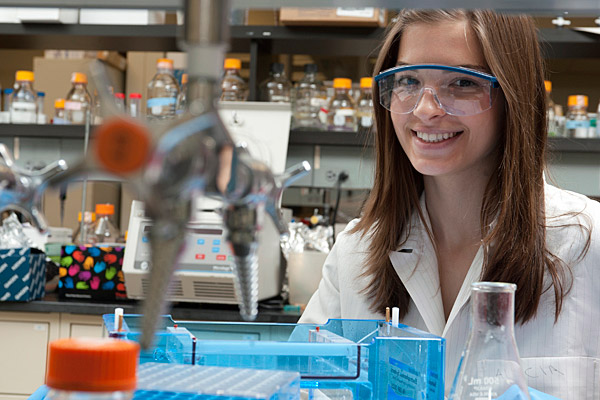Big data -Industry, academic partners meet to discuss analytics and implications of big data
1:02 p.m., Nov. 8, 2012–Every minute of every day, data grows exponentially. Web and social media activities, cell phone and GPS signals, business transaction records, digital documents and more generate massive amounts of data. In fact, this infographic by Josh James, founder and CEO of the business intelligence company Domo, shows Facebook users share 684,478 pieces of content, Google receives over two million search queries and consumers spend $272,070 on web shopping each minute.
Antoniewicz receives Mangone Young Scholars Award
Oct. 22, 2012–The University of Delaware’s Francis Alison Society has selected Maciek R. Antoniewicz, DuPont Young Professor in chemical and biomolecular engineering, to receive its 2012 Gerard J. Mangone Young Scholar award.
Named in honor of a distinguished University professor, the award is given annually to promising and accomplished young faculty. Recipients are chosen by fellow faculty members who have received the Francis Alison Award, the University’s highest faculty honor.
CIS professor co-authors first book on mining biomedical text
Sept. 27, 2012–University of Delaware professor Hagit Shatkay has co-authored a new book, detailing systematic ways to automate biological text analysis.
Entitled “Mining the Biomedical Literature,” the book offers readers a concise introduction on how to mine biological text effectively in order to find relevant information. The book also describes general techniques for retrieving and extracting information and analyzing text.
Paper describes new method to understand sources of noise in gene-expression
Sept. 25, 2012–Abhyudai Singh, assistant professor of electrical and computer engineering at the University of Delaware, describes a new method to understand sources of “noise” in gene-expression that create variability in protein levels in a paper published in Molecular Systems Biology, a publication of Nature, on Aug. 28.
This noise is expressed as variability in the levels of proteins/mRNAs in a cell.
Three UD Bioinformatics Students Attend High Performance Computing Workshop
 |
Aug 2, 2012–Three Bioinformatics students were selected to participate in the High Performance Computing Summer Institute at the Virginia Bioinformatics Institute at Virginia Tech.
UD, Fraunhofer researchers share their work in Dover
July 5, 2012–Three research teams from the University of Delaware (UD) and the Fraunhofer Center for Molecular Biotechnology (CMB) shared highlights of their work with Delaware legislators and their staff members in Legislative Hall on June 19.
Two of the highlighted projects are being funded through a six-year partnership agreement that includes UD, CMB and the state of Delaware.
UD’s Lachke selected Pew Scholar in the Biomedical Sciences
June 14, 2012–Salil Lachke, a University of Delaware biologist whose research is yielding new discoveries about the world’s leading causes of blindness, has been named a 2012 Pew Scholar in the Biomedical Sciences by the Pew Charitable Trusts.
Lachke is one of 22 scholars selected across the United States, and the first University of Delaware professor to receive the award, which recognizes the nation’s most innovative young researchers in medicine or the biomedical sciences.
NSF grant supports work in systems biology of cells in engineered environments
June 7, 2012–With the responsibility of great research comes the requirement of educators to also transcend traditional boundaries by integrating multi-disciplinary knowledge into their work. To do this, they must build a team of experts in other fields to integrate programs that will broaden the capabilities of future leaders.
Bioinformatics, systems biology topics of research conference
June 4, 2012–The second annual University of Delaware bioinformatics and systems biology research symposium was held Thursday, May 24, in the Embassy Suites Newark.
Hosted by UD’s Center for Bioinformatics and Computational Biology (CBCB), the event drew more than 100 participants, including faculty and students from various disciplines across UD, as well as representatives from companies, other academic institutions, and government labs and agencies.
Undergrad receives research fellowship to study deep-sea viruses

May 18, 2012–Jessica Chopyk, a junior biological sciences major at the University of Delaware, has won a $5,000 American Society for Microbiology Undergraduate Research Fellowship.
CBCB to host 2nd Annual Research Symposium on Bioinformatics & Systems Biology
On Thursday, May 24, 2012, CBCB will host its second Research Symposium at the Embassy Suites Newark. The goal of the 2012 CBCB Research Symposium is to showcase the Bioinformatics Network of Delaware (BiND) and to provide a venue for bringing together CBCB affiliated faculty and students from over ten departments acro
CBCB Bioinformatics Core Expands Next-Generation Sequencing Analysis Capabilities
Feb. 15, 2012–The Center for Bioinformatics and Computational Biology (CBCB) Core Facility has recently expanded its Next Generation Sequencing (NGS) analysis capabilities through software and hardware purchases made possible by Delaware INBRE and EPSCoR.
